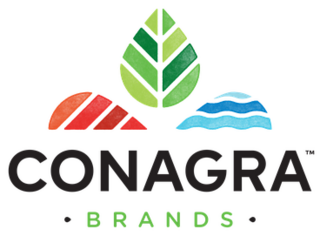
Cantonese or Guangdong cuisine, also known as Yue cuisine, is the cuisine of Cantonese people, associated with the Guangdong province of China, particularly the provincial capital Guangzhou, and the surrounding regions in the Pearl River Delta including Hong Kong and Macau. Strictly speaking, Cantonese cuisine is the cuisine of Guangzhou or of Cantonese speakers, but it often includes the cooking styles of all the speakers of Yue Chinese languages in Guangdong.

A frozen meal, prepackaged meal, ready-made meal, ready meal (UK), frozen dinner, and microwave meal portioned for an individual. A frozen meal in the United States and Canada usually consists of a type of meat, fish, or pasta for the main course, and sometimes vegetables, potatoes, and/or a dessert. Some frozen meals feature Indian, Chinese, Mexican, and other foods of international customs.

Conagra Brands, Inc. is an American consumer packaged goods holding company headquartered in Chicago, Illinois. Conagra makes and sells products under various brand names that are available in supermarkets, restaurants, and food service establishments. Based on its 2021 revenue, the company ranked 331st on the 2022 Fortune 500.

Vlasic is an American brand of pickles that is currently owned by Conagra Brands. Since its introduction in 1942, it has become one of the most popular pickle brands in the United States.

Kid Cuisine is a brand of packaged frozen meals first sold in April 1989 and marketed by Conagra Foods. Described as a "frozen food version of a Happy Meal", the product is marketed towards children, while assuring parents of nutritional benefits. The mascot of the brand is a penguin named K.C., while the former was a different penguin named B.J. and a polar bear named "The Chef".
Gerry Thomas was a Canadian who moved to the US to become a salesman. He is sometimes credited with inventing prepackaged meals in 1952. Thomas, who worked for the Swanson food company in America in the 1950s and went public with his account decades later, said he designed the company's famous three-compartment aluminum tray after seeing a similar tray used by Pan Am Airways. He also said he coined the name "TV Dinner" for such meals, brainstormed the idea of having the packaging resemble a TV set, and contributed the recipe for the cornbread stuffing. Thomas later said he was uncomfortable with being called the "father" of the TV dinner, because he felt he just built upon existing ideas.

Banquet Foods is a subsidiary of Conagra Brands that sells various food products, including frozen pre-made entrées, meals, and desserts. The brand is best known for its line of TV dinners.

Pinnacle Foods, Inc., is a packaged foods company headquartered in Parsippany, New Jersey, that specializes in shelf-stable and frozen foods. The company became a subsidiary of Conagra Brands on October 26, 2018.

The centerpiece of contemporary Thanksgiving in the United States and Canada is Thanksgiving dinner, a large meal generally centered on a large roasted turkey. Thanksgiving is the largest eating event in the United States as measured by retail sales of food and beverages and by estimates of individual food intake.
Sara's Secrets was a Food Network show hosted by Sara Moulton who was the executive chef of Gourmet magazine. Sara’s Secrets aired from 2002 until 2007. Sara's Secrets offers the viewer recipes and techniques specifically focused to fit the viewer's busy lifestyle.

Lean Cuisine is a brand of frozen entrées and dinners sold in the United States by Nestlé, and in Australia by Vesco. The brand began as low-fat, low-calorie versions of Stouffer's products. Today, Lean Cuisine includes traditional dinners, ethnic dishes, pizzas, whole-grain Spa Cuisine entreés, and panini. The headquarters of Lean Cuisine in the United States is located in Solon, Ohio, a suburb of Cleveland.

Celeste is a brand of frozen pizza owned by Conagra Brands. It is widely referred to by its former name Mama Celeste. The brand's slogan is Abbondanza, which means "Abundance" in Italian.

Chicken and dumplings is a Southern United States dish that consists of a chicken boiled in water, with the resulting chicken broth being used to cook dumplings by boiling. A dumpling—in this context—is a biscuit dough, which is a mixture of flour, shortening, and liquid. The dumplings are either rolled out flat, dropped, or formed into a ball.

Soup is a primarily liquid food, generally served warm or hot, that is made by combining ingredients of meat or vegetables with stock, milk, or water. Hot soups are additionally characterized by boiling or simmering solid ingredients in liquids in a pot until the flavors are extracted, forming a broth. Soups are similar to stews, and in some cases there may not be a clear distinction between the two; however, soups generally have more liquid (broth) than stews.

The Campbell's Company is an American company, most closely associated with its flagship canned soup products. Through mergers and acquisitions, it has grown to become one of the largest processed food companies in the United States with a wide variety of products under its flagship Campbell's brand as well as other brands including Pepperidge Farm, Snyder's of Hanover, V8, and Swanson. With its namesake brand Campbell's produces soups and other canned foods, baked goods, beverages, and snacks. It is headquartered in Camden, New Jersey.
Looney Tunes Meals were a line of frozen dinners released by Tyson Foods in 1990. They were based on the characters from the eponymous Warner Bros. cartoons and targeted primarily at children. The meals were discontinued in late 1993 because of declining sales.
Betty Cronin was an American bacteriologist and co-author of Campbell’s Great American Cookbook. Some call her "the mother of TV dinners", though the development of the idea has several claimants. She started her career in 1950 working for the Swanson brothers. Later, she moved on to work for Campbell’s Soups which bought out the Swanson brothers’ company, C. A. Swanson and Sons, in 1955. She was director at Campbell’s microwave institute in Camden, New Jersey.
















